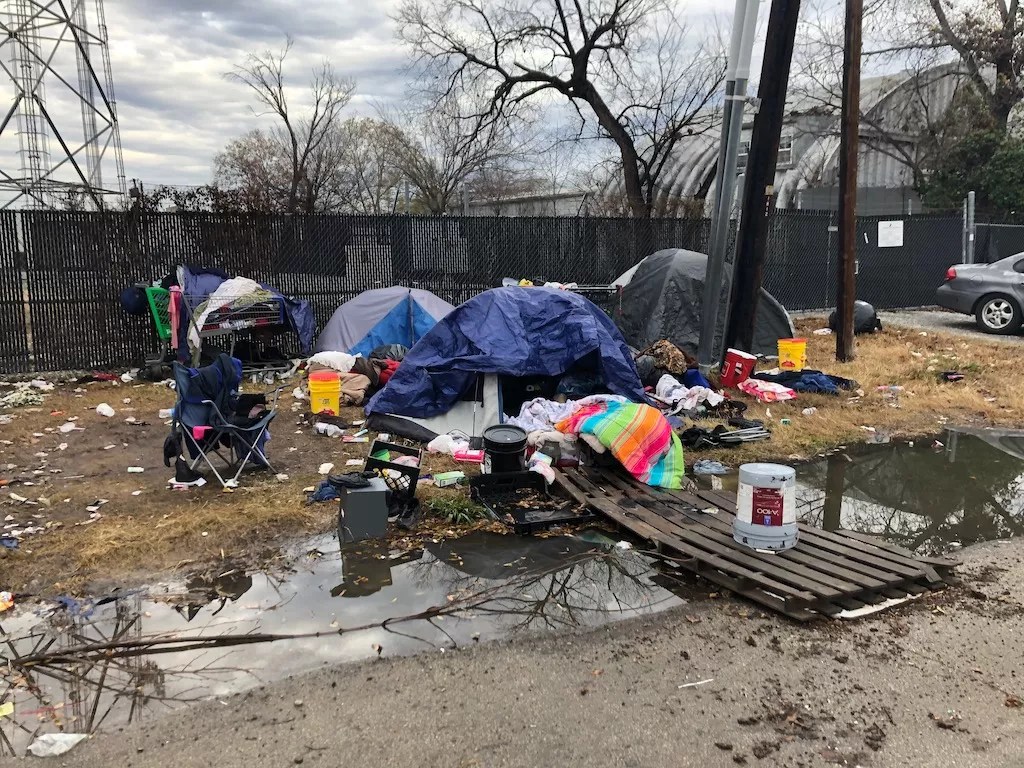
Lucas Manfield

Audio By Carbonatix
Usually, when the city wants to clear out homeless encampments they give individuals 72 hours to pack their things and leave. After those three days, a small army of people hired by the city shows up to get rid of all the people and things that remain.
Following guidance from the Centers for Disease Control and Prevention, the city is going to cut these folks some slack this month.
Per the CDC guidance, the Dallas Police Department, Office of Homeless Solutions and city contracted vendors have temporarily suspended their anti-encampment efforts throughout December, shifting the focus to ensuring these homeless populations don’t contract COVID-19.
In a memo last week, Kimberly Bizor Tolbert, the city manager’s chief of staff, said Dallas is seeing a “major surge” in COVID-19 cases in unsheltered homeless populations. Just last year, about 3,700 people in the city experienced homelessness, according to Metro Dallas Homeless Alliance. About 1,100 of those were unsheltered.
The CDC’s guidance states that clearing encampments can cause people to disperse throughout communities, breaking connections with service providers and increasing the potential for the spread of the coronavirus. Instead, if housing options are not available, the CDC recommends that people living in homeless encampments should be allowed to stay where they are.
The guidance states that people staying in these encampments should be encouraged to social distance and set up their tents or sleeping quarters with at least 12 feet of space between them. If this space is not available, the city should help decompress the encampments by linking people at increased risk of the virus with individual rooms or another safe shelter.
The city should also be helping improve sanitation at these encampments by ensuring they have nearby restrooms with hygiene products that are available 24 hours a day. If toilets and hand-washing facilities are not available to encampments of 10 or more people, the city should provide portable latrines for hand-washing equipped with sanitizer containing at least 60% alcohol.
“[The Office of Homeless Solutions] will continue to monitor, assess and provide sanitary products to known encampment locations to limit the potential spread and effects of COVID-19,” Tolbert said in the memo.
The pandemic has resulted in the steady growth of these encampments. In just the last 30 days, people have made 333 requests for homeless service, according to data from an online dashboard created by the city to track homeless encampments. Eighty-five of these requests for service remain open.
Kevin Oden, interim director of the Office of Homeless Solutions, did not respond for comment. However, in October, Oden told The Dallas Morning News that clearing the camps betters the quality of life in the city, but that it’s not a mark of success. He said the ultimate goal is to transfer people from encampments to housing.
The near future may bring more housing for people experiencing homelessness, and Dallas will probably need it as some expect tens of thousands of evictions after the CDC’s eviction moratorium expires at the end of the month.
According to KERA, the nonprofit Catholic Housing Initiative and the city are working to transform the former Gateway Hotel into St. Jude Center – Park Central, a space where eventually 180 rooms will be used to house homeless individuals. The project is being paid for by federal Coronavirus Relief Funds. The Dallas City Council will vote on a similar hotel project during their meeting this Wednesday.